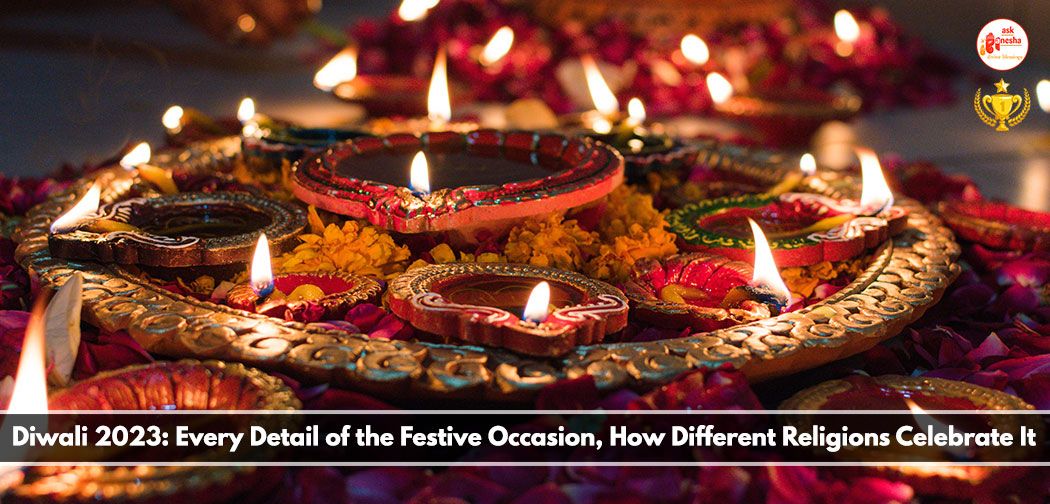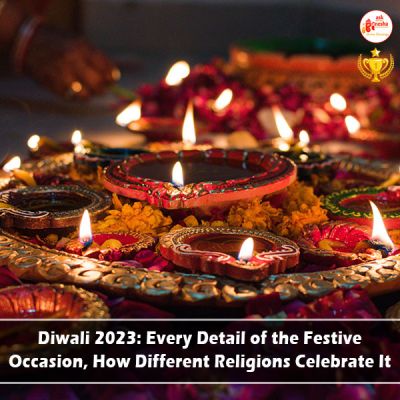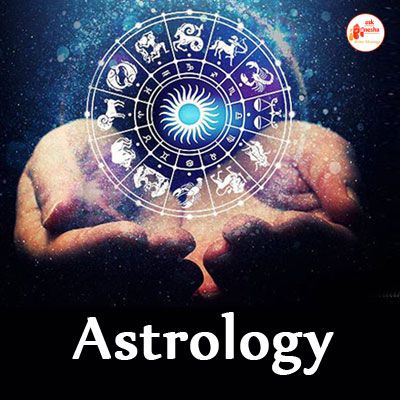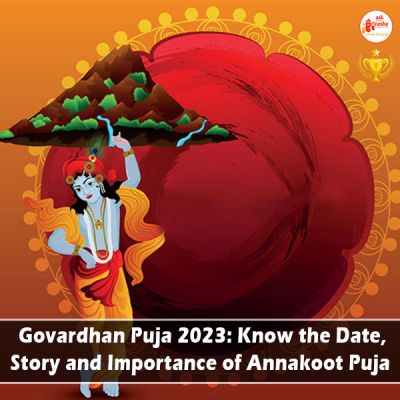Diwali 2023 is on the offing and people round the globe are waiting with utmost zeal for the glowing occasion. From the astrological viewpoint, Diwali is regarded as the occasion signifying the victory of light over darkness and good over evil. Diwali is associated with numerous beliefs both religious and astrological. People are of belief that during this auspicious time, Goddess Lakshmi becomes ready to shower her blessings upon the devotees who pray to her earnestly for offering affluence and prosperity to them. Let’s dip delve into the significance of Diwali 2023 and try to find out various rituals and customs related to this festive occasion.
Read More on Diwali 2023: Avoid Keeping These Things at Home to Avert Financial Loss
Diwali 2023: Date and Time
In 2023, Diwali is going to be celebrated on November 12, Sunday. The festival is celebrated for 5 days, starting with Dhanteras on 10th November and ending with Bhai Dooj on November 15th. The 5 days of Diwali comprise of different rituals and significances. Dhanteras, falls on November 10th. It is the day when people buy gold, silver, and various other items to invoke good luck and prosperity at their respective homes. On November 12th, on the very day of the Naraka Chaturdasi, known as Chotti Diwali too, people light diyas and candles to keep away evil spirits. The main day of Diwali is on November 12th, the day of the Lakshmi Puja.
On November 14th Govardhan Puja takes place. On this very day people worship Lord Krishna and offer fodders to cows. The final day of Diwali is the Bhai Dooj, falling on November 15th. On this day, sisters pray to the God for the well being of their brothers. According to the Hindu calendar, the Amavasya Tithi for Diwali 2023 begins on 12th November at 02:45 PM and ends on 13th November at 02:57 PM. The Pradosha Puja is scheduled on 12th November from 05:39 PM to 08:16 PM.
Ganesh Puja on Diwali 2023
Ganesh Puja during Diwali is the most important ritual for Hindus. Lord Ganesha, the god of wisdom and prosperity, is known to removes all obstacles from lives and blesses humans with success and happiness. Let us cast a glance on how the Puja is done.
Read more: Diwali Sweets as per zodiac signs
• Before starting the Puja, clean your home and decorate the Puja area with flowers, lights, boquets and garlands.
• Before the Puja, it is necessary to take a bath and wear clean clothes.
• Place a statue or picture of Lord Ganesha on a platform, a bowl of rice, flowers, incense sticks, and sweets for the Puja should also be kept.
• Light a lamp of either oil or ghee.
• Pray to Lord Ganesha and ask for His blessings. Chant his mantras and offer him sweets and other items.
• Perform the aarti of Lord Ganesha by lighting a diya and waving them in front of the statue or picture.
• Distribute prasad to your family and friends.
Celebrations of Festival of Lights in Different Religions
Diwali, known as the festival of Lights is a vibrant celebration for many religions around the world. Though it is traditionally a Hindu festival, Jains, Sikhs, and Buddhists too celebrate the festival as per their unique customs and rituals. Let’s see how different religions celebrate Diwali after their own sweet will.
Hinduism
The celebration of Diwali is is a vibrant festive occasion of the Hindus living in India and other parts of the globe. People decorate their homes with lights, rangolis, and flowers to create a festive atmosphere. The day starts with a Puja of Lord Ganesha and Goddess Lakshmi. Both of them are believed to shower of people fortune and wealth. Even all the barriers on the way are also removed.
Read more about Sampoorna Diwali Puja
In the evening, people light diyas or candles, and decorate homes with various lights. They burst firecrackers to celebrate the victory of good over evil. The tradition of lighting diyas and candles and bursting of crackers dates back to ancient times when people celebrated the occasion to welcome Lord Rama who was returning from the exile and demolishing the powerful demon king Ravan and his associates. The bursting of firecrackers goes on signifying the joyous celebration of the victory over evil. On this occasion of Diwali there is the exchange of gifts and sweets among dear and near ones. Offering gifts on the occasion of Diwali cements relationships and beckons good luck and prosperity. In addition to the celebrations, Diwali is a time to remove all kinds of negativity and beckon positivity. Diwali 2023 will be celebrated keeping all these things in view.
Jainism
Diwali, coincides with Mahavir Jayanti, an important festival in Jainism that reminds the devotees of the attainment of Nirvana by Tirthankara, Lord Mahavir. The festival is observed with high enthusiasm by Jains all over the world. On the day of Diwali the Jain festival starts. They wake up early and offer prayers at the Jain temples called Derasars. They decorate temples with colorful lights, and participating in worship goes on reciting Jain scriptures. The morning prayers being over, Jains engage in community services offering selfless service to all in need. This is known as Seva and is an integral part of the Jainism. In the evening, Jains light lamps and candles at homes and take part in fireworks. They don’t go for firecrackers, rather light fireworks to celebrate the occasion of Nirvana by Lord Mahavir.
Read More: Diwali- Festival of Lights
Another essential part of the Diwali celebration among the Jains is to prepare and share sweets and various delicacies among all. Jains prepare and share sweets like laddu, Peda, to friends and near ones.The significance of Diwali in the very Jainism is not only the attainment of Nirvana by Lord Mahavir, it reminds the Jains all over the world of their duty to live a humble life following the tradition of non-violence, self-discipline, and compassion towards all living beings on this mundane world.
Sikhism
Diwali, known as Bandi Chhor Divas to the Sikhs, holds a special significance among them. They celebrate the special day to mark the release of Guru Hargobind Sahib Ji, the 6th Sikh Guru, and 52 other princes from the Gwalior Fort. Emperor Jahangir imprisoned them for no reason in 1619. Sikh people celebrate the festival with great enthusiasm and fervor all over the world. On the particular day of Diwali, Sikhs wake up early in the morning and throng there to pray at the local Gurdwaras. They decorate the Gurdwaras with colorful lights and take part in kirtans, and Ardas, a special prayer of the Sikh religion. After the morning prayers, they engage in community services and try to spread their helping hands to the distressed people.
In the evening, diyas and candles illumine the homes of the Sikhs and fireworks are on the display like other parts of India. Sikhs go for fireworks to celebrate the occasion when Guru Hargobind Sahibji and the other princes were released from the Mughal custody. Another aspect of the Diwali celebration in Sikhism is to distribute traditional sweets like barfi, laddoo and sweet kheer among people.
The significance of Diwali in Sikhism is not limited within the release of Guru Hargobind Sahibji, it is a celebration of the triumph of freedom over oppression. It works as a reminder to Sikhs of their duty to stand up against injustice and oppression and to fight for the welfare and freedom of mankind.
Buddhism
Diwali, is known as Tihar, in Buddhism. It is celebrated in some parts of India and Nepal where Buddhists are in dominant number. In these areas people celebrate Diwali as a 5 day long festival having its significance and rituals.
On the very first day, Buddhists worship cows, sacred in Hinduism. Cows are adorned and are offered food and prayers.
On the second day, Buddhists go for worshipping dogs that are considered loyal companions of man. Dogs are adorned too with colorful dresses and are offered food.
On the third day, cows and Laxmi, the goddess of wealth and prosperity are worshipped together.
On the fourth day, Buddhists pray to oxen, essential for agriculture and farming. Oxen are adorned too with colorful things and are offered food.
On the fifth day, Buddhists go for celebrating the Bhai Tika, a day of the siblings. Just like Hindu Bhai Dooj, Sisters apply a tikka, a mixture of colors, rice, and curd on their brother’s forehead and offer them sweets. Finally they pray to God for the well-being and longevity of their brothers.
Buddhists also light diyas and candles at homes and take part in community service, distribute sweets among friends and family members. Diwali in Buddhism is not limited within the spheres of rituals and celebrations. It is nothing but a reminder to Buddhists of the very importance of compassion, selflessness, and inner peace.
To Conclude
Whatever the meaning of Diwali 2023 to all other religions to either Hindus or other believers of religions, it is the best thing to go for ultimate prayer to abstain from all kinds of violence and despises. The ultimate prayer should be stay happy and make happy.
For Interesting Astrology Videos and Post, Follow us on Instagram























 Translate
Translate